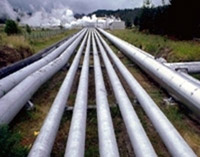Russian President Vladimir Putin signed a multilateral “Burgas-Alexandropolis” oil pipeline construction treaty in Athens last week during his round-trip to Europe, Greece and Bulgaria.
What does Russia have to do with this treaty? Well, for one, the oil will reach the Bulgarian Burgas harbor by tanks from Novorosiysk, after which the oil will travel to Alexandroupolis by a 280-kilometer oil pipeline and then reach Europe by tanks. We believe that we are dealing with nearly 50 million tons of oil. Fifty-one percent of the oil pipeline shares belong to the Russian side and the rest is equally divided between the two other participants of the project. The oil pipeline will start working in 2010 and may become a real alternative to the well-known “Baku-Tbilisi-Jeyhan” (BTJ) oil pipeline. Experts say that the biggest advantage of this pipeline is that it will circumvent Turkish harbors. But Ankara is extremely restive towards having foreign countries’ boats passing through its harbors. Turkey is of the opinion that the price of the Russian oil reaching the European market may be reduced by passing through Dardanel and Bosphor.
The BTJ pipeline construction participants were apparently calm regarding the treaty signed in Athens, but they think that the announcements claiming that the new “Burgas-Alexandroupolis” pipeline will serve as an alternative to the BTJ pipeline are visionary. But that is not the case; otherwise the U.S. would not pressure Greece that much, calling on the country to give up on the pipeline construction. According to some sources, Washington is trying to lure Athens with other courses. But in the end the Greek preferred to co-operate with their Orthodox allies and not aggregate their energetic dependence on Turkey and we can’t say that relations between Greece and Turkey are good.
Now there will evidently be a serious struggle for Kazakhstan. The abovementioned pipeline will not be that effective without the oil of Kazakhstan and as a standard, this will be where there will be a clash of Russian and Western interests. By saying interests I should focus on U.S. interests. As Georgian energetic issues specialist Gia Khukhashvili told journalists, there is a brutal, substructure war going on in front of our eyes. According to him, by trying to preserve and strengthen its influence, Moscow will start the construction of other pipelines and may try to reduce the significance of the BTJ pipeline with its policies. Russian specialist Valeri Nesterov agrees with such an evaluation of events, but he is reserved. Nesterov believes that the enormous amounts of Kazakh oil will not only be used for two oil pipelines, but it will also be used to provide oil to China and other countries to the East. However it should be noted that Western investors working in Kazakhstan talk about China with disgust, preferring to deal with Western consumer markets. Generally, hydrocarbon exports have become a political issue recently. In that sense, it seems as though the U.S. considers it a duty and national issue to tell oil-enriched countries where to export their oil and at what price. That said, Washington will continue its pressure and there will be even more pressure and not only on Greece, but also on all the countries that are actively involved in the fields of oil and generally the energetic sector as non-consumers.

